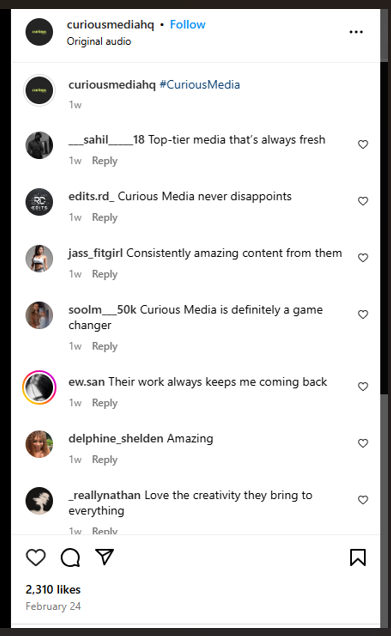Poppy Reid’s podcast venture bulks up audience with brand switch
Poppy Reid’s new podcast network, Curious Media, launched this week with a big social media following that was inherited ready made from a brand with no content overlap.
Curious Media already boasts nearly 120,000 Instagram followers, thousands of likes on its seven visible posts, and a number of comments that appear bot-generated. The comments include platitudes like “always impressed by their unique approach” and “consistently amazing content from them”.



You’re right—there isn’t inherently an issue with handing over social media accounts, provided there’s transparency. The real concerns, however, centre around authenticity and openness with the audience, particularly when there’s potential monetisation involved.
In this case, it’s pretty blatantly obvious that they’ve paid for fake likes, fake comments, and fake engagement, particularly noticeable on their blurred images. This isn’t genuine and certainly doesn’t reflect well on them. When they start attempting to book advertisers, it raises a critical question: what exactly are brands paying for? Essentially, it’s fake engagement, which undermines trust and the value advertisers expect.
Genuine engagement builds trust, fosters community, and ensures advertisers receive authentic and measurable returns on their investments. Artificially inflating metrics through bought interactions compromises the platform’s integrity and misleads potential advertisers.
Additionally, clarity is crucial when transitioning accounts. Communicating clearly about the handover or rebranding maintains trust and respects the audience who originally followed for specific content. Without transparency, followers might feel deceived, and advertisers risk investing in something lacking authentic audience interest.
While it’s true that followers can simply choose to unfollow if content changes, the core issue remains the lack of upfront disclosure followed by botted like (3,000+ per post) and botted comments from fake accounts.
Well done Mumbrella. I just think the industry will move closer to ultimate media transparency and accountability. The long game is about establishing audience listener and consumption habits, as opposed to having the appearance of popularity. Unless of course the plan is to find a cashed up buyer after a few years – then yes use these smoke and mirror tactics.
The misdirection worked last time, high chance it works again. Media not known for its due diligence.
Why does this matter? I am about to handover a couple of social media accounts I have used for a business to someone else who is starting a business. When they take over, they will announce who they are, and at that point, the audience chooses right? It’s just a simple unfollow if the user isn’t interested in the new content.
Interesting that they have brought in the “high profile talent” of Merrick Watts, Ben Lee and Ione Skye under the umbrella of their launch venture, who do undisputedly have high profiles, talent, and large social media presence of their own accord. Ergo, how could they not create a start up venture based off the talent they are backing rather than fostering a false narrative from the get go with bot engagement and bought followers? It all seems very fake and inauthentic for a media brand wanting to instill a sense of authenticity and trust in an already saturated market.
I understand how important genuine engagement is. So disingenuous bot comments are going to do much for the brand right? And advertisers are pretty smart about this by now (hopefully) or should be.. if there is no transparency, authenticity, or openness and all the comments are ‘paid for bots’ then it’s not going to bode well for monétisation. Surely they can do whatever they want to do, and until they are actually misleading advertisers, who cares? It’s only their long game at risk?